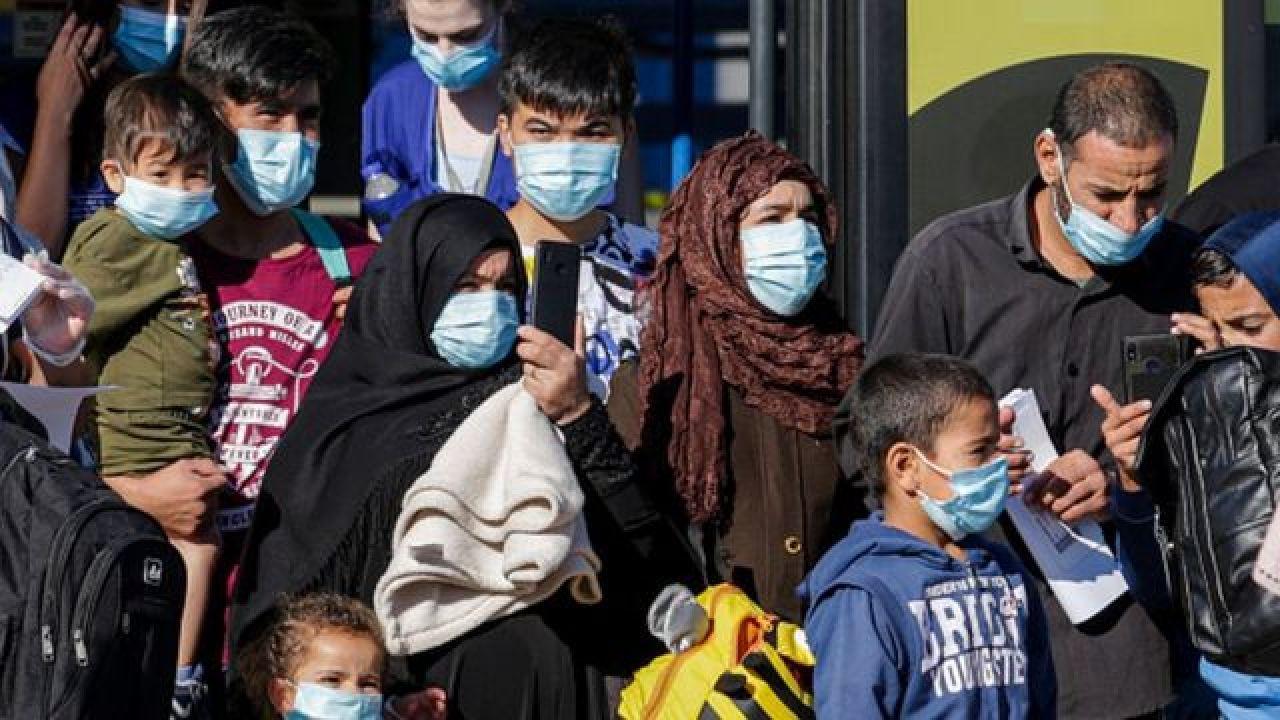The EU in the grip of a migration crisis Expert opinions on Caliber.Az
German Chancellor Friedrich Merz is open to the idea of sending refugees to third countries and advocates for a “more decisive fight” against illegal migration at the EU level, according to Deutsche Welle. He made the statement during a meeting with Italian Prime Minister Giorgia Meloni in Rome.
“First and foremost, we want to swiftly implement the new restrictive European asylum rules. We also want to deepen cooperation with third countries in this context. The initiatives undertaken by Italy in recent months, especially in cooperation with several Mediterranean countries, have proven to be extremely successful. These are good initiatives that we in Germany support,” Merz said.
Italy had previously reached an agreement with Albania to house refugees rescued in the Mediterranean in reception centres on Albanian territory. These individuals are to remain there while Italian authorities process their asylum applications. However, there are currently no refugees in Albania, as legal proceedings have delayed their relocation. Since the end of 2024, the European Court in Luxembourg has been reviewing whether these reception centres comply with EU law.
“We are aware of the difficulties, including court decisions in Italy, for example regarding cooperation with Albania. But of course, this could still be an option,” Merz added.
He noted that “this is a contribution to easing the problem, but not a solution to it.”
It appears that Germany has recently become seriously concerned about the problems posed by radicals and terrorists entering the country alongside ordinary refugees. On May 15, Germany’s new Federal Minister of the Interior, Alexander Dobrindt, announced a tightening of the government’s migration policy. The chosen location for this announcement was a border crossing near Kiefersfelden, a picturesque Bavarian town at the foot of the Austrian Alps. In the presence of the head of the German Federal Police, Dieter Romann, the Interior Minister reminded the gathered journalists that the conservatives had called for a crackdown on illegal migration during their election campaign — and now intend to deliver on that promise.
For many years, anyone who managed to reach Germany by any means and declared an intention to seek asylum was allowed to enter the country. Now, in contrast to previous years, asylum seekers will be turned back at the border — in other words, they will not be allowed into the country.
Let us recall that in the early hours of Sunday, May 18, a 35-year-old Syrian national carried out a knife attack on patrons of a bar in Bielefeld. Five people were injured — three are in serious condition, and another is in critical condition. The victims include four young men and one woman, all between the ages of 22 and 27. The attacker left behind a bottle containing a liquid that smelled like gasoline. He was “attacking people at random,” according to a joint press release from the prosecutor’s office and police.
So, can all the aforementioned measures really help Europe rid itself of uncontrolled migration? Can they restore some order to this sphere? Prevent the infiltration of terrorist elements?
Leading European experts shared their views on the matter with Caliber.Az.

Polish analyst Dariusz Popek, a professor at the University of Rzeszów and editor-in-chief of the journal Caucasus: Past, Present, Future, noted that this is a long-standing issue that has grown over time due to years of accepting refugees, primarily from Arab and African countries.
“This was largely linked to various conflicts that have occurred — and continue to occur — in those regions. The process intensified and was also driven by the uncontrolled arrival in the EU of people seeking to improve their situation for economic reasons. As a result, and due to the conditions created, a certain number of individuals connected to Islamist extremist or criminal groups entered Europe. The consequences are seen in terrorist attacks and rising crime rates in some countries.
Both the EU and individual member states have taken, and continue to take, various measures to address the crisis based on their specific circumstances. In particular, border countries facing new waves of refugees — such as Spain, Greece, Italy, and Poland — are implementing their own initiatives, as they are directly affected. Germany, Austria, the Netherlands, and other EU countries are dealing with problems caused by the large numbers of refugees they have taken in, which in turn impact internal security. These governments are compelled to act, as the current EU policy — largely shaped by left-wing political parties in power in some member states — is no longer supported by the public,” the historian stressed.
As an example, he pointed to Poland, which in recent years has faced a refugee crisis, primarily involving migrants from Arab and African countries entering Poland via Belarus.
“To bring the situation under control, Poland has spent—and plans to spend—billions of dollars on security and infrastructure necessary to monitor its borders and ensure the safety of both its own citizens and the EU as a whole, given that this is the EU’s external border.
In this context, the issue of refugees, economic migrants, and illegal immigrants is just one of several pressing concerns that have prompted a recent shift in approach, particularly within the EU. Therefore, we need to take a broader view.
In the early decades of the 21st century, following the decline of Russia’s global influence and the West’s perceived victory in the war on Islamic terrorism, the countries of the so-called Western civilisation—especially the EU and the United States—focused on pursuing policies of free trade (including China’s accession to the World Trade Organization and attempts to normalise relations with Russia through economic interdependence); environmental protection and sustainable development (the so-called ‘Green Deal’ and investments in renewable energy); and liberal ideas and human rights (gender equality, gender identity, cultural diversity, refugee protection), which were largely embraced by the public during times of economic growth and prosperity.
At the same time, in the current decade, the world has faced a series of consecutive crises, periods of uncertainty, and social instability. These include the COVID-19 pandemic, the war in Ukraine, the escalating U.S.-China rivalry that threatens global trade, and a broader shift in political and economic frameworks largely driven by the United States,” the analyst noted.
This, he noted, has led to the rise of right-wing sentiments, which have been capitalised on by political movements in various countries.
“A clear example of this is the election of Donald Trump as President of the United States and the growing popularity of right-wing parties across many EU countries—such as in Hungary, Poland, the Netherlands, Slovakia, Denmark, Sweden, Germany, France, and Italy. During times of crisis, there is a noticeable decline in support for egalitarian political ideas promoted by left-wing parties, as these ideals often seem abstract and disconnected from the daily realities faced by Western societies today.

The vision of a socially, civilisationally, and economically progressive world (or society)—based on mutual respect, cooperation, and lofty ideals—long promoted by left-wing parties, has been brutally contradicted by the current realities confronting citizens of wealthy Western countries. The promised growth and widespread access to prosperity and resources are increasingly limited to a shrinking elite. Meanwhile, the majority of society is left to grapple with the problems that have emerged as a direct consequence of left-leaning policies: for example, environmental protection efforts have contributed to rising energy prices and increased business costs; uncontrolled immigration has fostered a sense of insecurity, rising crime rates, a lack of assimilation, and diminished societal cohesion.
As a result of growing social dissatisfaction, political demands increasingly focus on ensuring economic, internal, and external security. This includes prioritising national economic interests, building independent military capabilities as a tool for sovereign policy-making (with war seen as a means of political pressure), and emphasising internal security policies aimed at reducing and controlling the influx of illegal migration into the EU and the US.
This shift has also led to changes in the political platforms of major centrist and left-wing parties in the EU—for example, in Germany, France, and Poland—which have had to adjust their current course to protect their political influence and maintain power.
Consequently, we see various initiatives and measures being implemented today—efforts to regulate and control migrant flows in ways that ensure the highest levels of security and social integration.
However, both the EU and the US will require more migrants in the coming decades of this century to ensure a supply of cheap labour and to maintain their levels of economic development amid political and economic competition in a multipolar world. This is because economic potential forms the foundation for protecting and advancing their own interests and political goals, including those pursued through military means.
At the same time, we must recognise that on a global scale, the next decade will likely see some easing of the escalating conflict between the US and China, the world’s largest economies, as both countries prepare intensively for this eventuality.
In this context, the EU will need to focus in the coming years on resolving its internal issues and strengthening its crisis management capabilities in order to face what may be the most serious challenge the world has encountered since World War II,” Popek concludes.

Analyst, publisher, and editor-in-chief of the magazine Neue Zeiten and the YouTube channel Neue Zeiten TV (Germany), Alexander Cherkassky, noted that the task of combating illegal migration has two sides.
“On one hand, it is necessary to stop the flow of refugees from the Middle East, Afghanistan, and North Africa. The new German government is trying to take action, but there is no certainty that there is enough political will or material resources (such as sufficient police forces and their logistical support). Efforts in this direction may be hindered by coalition partners—the Social Democrats.
The second factor concerns the refugees already living in Germany, who should be encouraged to return home or deported if they have been ordered to leave the country. Overall, I am pessimistic about the ruling coalition’s ability to solve this problem,” Cherkassky concluded.








